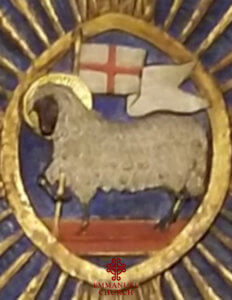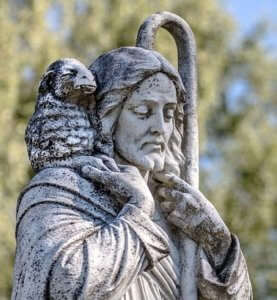
Building the Kingdom of God from the Back Office
I spent this last week in London attending the annual meeting of the Compass Rose Society. Compass Rose is an international mission organization, with concentrations of membership in Hong Kong and North America. Compass Rose was formed a little over 20 years as a response to needs in the global Anglican Communion that get in the way of the Archbishop of Canterbury’s ministry of relationship and connection. There are 40 provinces now in the Anglican Communion. They’re in 168 countries and on every continent.
Compass Rose Society
The Archbishop of Canterbury is the patron of the Compass Rose, and the Secretary General of the Anglican Communion is an ex officio board member. Compass Rose is not a relief organization – that’s for organizations like Episcopal Relief & Development and Save the Children. Instead, Compass Rose’s focus is on connection — on raising and distributing resources to promote communication and dialogue and strengthen relationship within and among the provinces of the global Anglican Communion — basically building up the Kingdom of God.
I’ve always liked to think of Compass Rose as the unofficial fifth instrument of communion, right behind the actual four instruments of communion: the Archbishop of Canterbury, the Primates Meeting, the Lambeth Conference, and the Anglican Consultative Council. I say that the Compass Rose is the unofficial fifth instrument of communion because it’s not written down anywhere. It’s based solely on relationship, which seems really Anglican to me.
Ubuntu
I think of the African concept of Ubuntu that Archbishop Desmond Tutu has often described in the context of Anglicanism: we are who we are because of others, and we belong in the great bundle of life. Compass Rose’s holy opportunity in mission is to participate in that great bundle. And to help, where it can, to bring the great bundle of the Anglican Communion together and strengthen its connection — through unity and not unanimity. We don’t have to agree — we just have to walk together as a family and love one another.
In our meetings this last week, we heard from the Michaela Southworth, the charismatic and competent Director of Finance and Resources for the Anglican Communion Office. Michaela is a former investment banker turned back office evangelist, who makes the  numbers speak of God and puts pounds (and dollars) to work for the glory of the kingdom. Michaela has a great sense of humor and lovely dark blue hair — she calls this her I’m-never-going-back-to-investment-banking-hair), and she sees her work as building God’s kingdom from the back office. I think this is a perfect description of the Compass Rose Society’s work — and for our work here at Emmanuel Church.
numbers speak of God and puts pounds (and dollars) to work for the glory of the kingdom. Michaela has a great sense of humor and lovely dark blue hair — she calls this her I’m-never-going-back-to-investment-banking-hair), and she sees her work as building God’s kingdom from the back office. I think this is a perfect description of the Compass Rose Society’s work — and for our work here at Emmanuel Church.
Compass Rose is gathering resources for scholarships for the 50% of the Communion’s 950 bishops who cannot afford to attend the Lambeth Conference without financial support — because we can’t hold together as a communion — as a family — if we’re missing 50% of our great bundle of life. That’s just like Emmanuel Church working on its stewardship campaign. We’re talking about pledges to support our lives in Christ here at Emmanuel
— to hold our community in Christ together as a family — continuing to gather, worship, celebrate eucharist, and love our neighbors as members of the great bundle of life, as Archbishop Tutu would say.
Feast of Christ the King
Today we celebrate the Feast of Christ the King, which was first introduced in the Catholic Church by Pope Pius XI in 1925. The pope wanted to focus attention on the reign of Christ at a time of turmoil in global politics. And it’s a great time for us to focus on the reign of Christ by celebrating the Feast of Christ the King today, while we are reflecting on how we build and support the Kingdom of God in the global communion and here at Emmanuel.
As preacher Yvette Schock writes, the Feast of Christ the King gives us an opportunity to consider how we live out our faith in the public sphere. None of our current political leaders cares if we call Jesus “King” or “Lord,” but Roman rulers and citizens in the first century took it as a serious challenge to the authority of Rome.
What authorities, powers, and influences compete for our allegiance now? How do we act out our allegiance to the reign of Christ in our lives—as family members, co-workers, students and teachers, neighbors, and citizens?
 Our reading from Jeremiah today shows us what God’s kingdom looks like through the image of shepherds and sheep. While I really like sheep as creatures, I know that some of you may not feel flattered or dignified by being compared to sheep. But as we try to understand what the Kingdom of God might look like, I think it’s more important to focus on the relationship between the shepherd and the sheep, and not how we feel personally about being compared to sheep.
Our reading from Jeremiah today shows us what God’s kingdom looks like through the image of shepherds and sheep. While I really like sheep as creatures, I know that some of you may not feel flattered or dignified by being compared to sheep. But as we try to understand what the Kingdom of God might look like, I think it’s more important to focus on the relationship between the shepherd and the sheep, and not how we feel personally about being compared to sheep.
For herding cultures like those in Jeremiah, a family’s entire wealth — and therefore survival — was tied up in their herd. Making sure that the sheep moved from place to place to find the best grasses and shrubs in dry climates like Israel and Judea was Job 1 for the family. The sheep had to be sheltered from predators, harsh weather, and dangerous terrain. They had to have enough grasses in the spring after the rains to survive lambing season and build the herd for the next year. They needed water enough in a climate where water is scarce.
Woe to the shepherds who destroy and scatter the sheep of my pasture, God says through the prophet Jeremiah. These shepherds who shepherd my people [that is, kings and leaders who have not been good shepherds] — it is you who have scattered my flock, and have driven them away, and you have not attended to them.
What is a shepherd’s job like? It’s not a desk job. You’re absolutely going to get your hands dirty. You might find yourself having to deliver a lamb, head off a jackal, or bind up a sheep’s injury if your sheep encountered rough terrain or early dark as you tried your best to keep them fed and watered. The shepherd doesn’t wear a crown, or use hairspray to stay camera-ready. And a shepherd doesn’t have a corner office, or an Oval Office, or a limousine. A shepherd walks at the back of the flock, not out front. And if you think that sheep smell bad, you can be pretty sure that the shepherd will too, because the shepherd is right there to get the sheep out of whatever trouble they’ve gotten into, because the sheep are everything to the shepherd.
The image of God as the good shepherd fits into the Prophet Jeremiah’s landscape, not only because of the dominant herding culture at the time, but also because the good shepherd is a reversal of a typical civil leader, then and now:
So I will attend to you for your evil doings, says the Lord. Then I myself will gather the remnant of my flock out of all the lands where I have driven them, and I will bring them back to their fold, and they shall be fruitful and multiply. I will raise up shepherds over them who will shepherd them, and they shall not fear any longer, or be dismayed, nor shall any be missing, says the Lord.
And this is the reign of Christ the King, the Good Shepherd. Jeremiah tells us that the Lord says The days are surely coming when  God will raise up a king who will deal wisely, and shall execute justice and righteousness in the land, and then Judah will be saved and Israel will live in safety. This is different from what we expect, right?
God will raise up a king who will deal wisely, and shall execute justice and righteousness in the land, and then Judah will be saved and Israel will live in safety. This is different from what we expect, right?
Yvette Schock writes, The kings in our holy stories are fearful — even paranoid — and they give mandates, shape policies, and build infrastructure in order to harm and diminish the people they see as threatening. They use their power to benefit themselves, regardless of the injury caused to others. They take actions that have serious consequences for others for no reason but to save face, and they can be thin-skinned, impulsive, and even vengeful. In the Kingdom of God — the Reign of Christ we celebrate today in the Feast of Christ the King — different things matter. Story after story in scripture attests to a reign in which a new authority is established, one that will help us to fulfill our human potential.
As Michael Battle says, Christ the King is aware that his kind of reign carries a price. The price is that we who follow Christ must now be a different kind of people in the world — caring for each other in relationship, learning from each other, valuing each other as fellow Christians in the new order of the kingdom of God. It seems to me that the kingdom of God is always built from the back office — taking into account the most basic needs and resources — and mixed and baked in the kitchen.
The Kingdom of God is real and alive — all about life, love, bread, wine, neighbor, and Jesus — the simplest and most holy things. Let’s be thoughtful and intentional now as we make our pledges to sustain our lives together here at Emmanuel. Let’s work to plan and resource our lives in a world where Christ is King.
Where else but the back office or the kitchen would you start building God’s kingdom? It’s where all the real stuff happens. Amen
